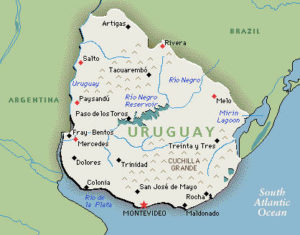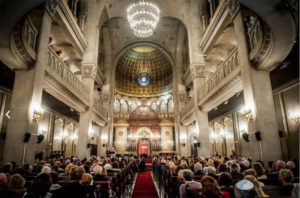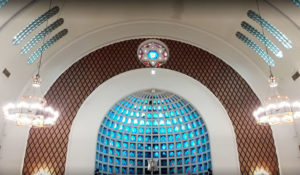 The arrival of Jews to Uraguay goes back to the 16th century, when conversos began settling there. The first recorded Jewish settlement there was in the 1770s. When the Inquisition ended in 1813, it paved the way for Jews being more accepted in Uruguay throughout the 19th century.
The arrival of Jews to Uraguay goes back to the 16th century, when conversos began settling there. The first recorded Jewish settlement there was in the 1770s. When the Inquisition ended in 1813, it paved the way for Jews being more accepted in Uruguay throughout the 19th century.
Today’s Jewish community dates back only to 1898. A 1909 report indicates that there were 1,700 Jews in the country, with 150 Jews in Montevideo. Despite the history of settlement, the community did not open its first synagogue until 1917. Immigration increased notably between 1925 and 1928, when Uruguay also served as a transit point, in some cases for illegal transit, to Argentina, which at that time had stringent immigration regulations. A large percentage of Jewish immigrants during this period were German Jews and Italian Jews. In 1933 there was again an increase in immigration, although just prior to World War II new limitations were imposed. In 1939, 2,200 Jews entered the country, while in 1940, only 373. By the end of the Second World War, the community reached its peak of 50,000 people.
 During the establishment of Israel in 1948 and the subsequent 1948 Arab-Israeli War, which involved the mass exodus of Jews from Arab and Muslim countries, primarily to Israel, more than 18,000 Jews immigrated to Uruguay, primarily from the Arab world and Rhodes. In the 1950s, a number of Russian Jews and Hungarian Jews moved to Uruguay.
During the establishment of Israel in 1948 and the subsequent 1948 Arab-Israeli War, which involved the mass exodus of Jews from Arab and Muslim countries, primarily to Israel, more than 18,000 Jews immigrated to Uruguay, primarily from the Arab world and Rhodes. In the 1950s, a number of Russian Jews and Hungarian Jews moved to Uruguay.
Between 1954 and 1956, the Sassoon family constructed the Comunidad Israelita Sefaradi, also known as Synagogue Beth Israel, on Buenos Aires Street. The architecture is similar to New York’s Portuguese synagogue, Congregation Shearith Israel.
 During the military dictatorship that ruled from 1973 to 1984, many Jews relocated to other countries for political and economic reasons. In 2002 the country underwent the worst economic crisis in its history and almost one third of the population fell below the poverty line. Between 1998-2003, more than half of the community’s 40,000 Jews emigrated, mostly to Israel.
During the military dictatorship that ruled from 1973 to 1984, many Jews relocated to other countries for political and economic reasons. In 2002 the country underwent the worst economic crisis in its history and almost one third of the population fell below the poverty line. Between 1998-2003, more than half of the community’s 40,000 Jews emigrated, mostly to Israel.
The Jewish community of Uruguay is made up of 10,000 families of Polish-Russian, Sephardi, German and Hungarian descent. Most live in the capital city of Montevideo, but there is a very small, organized community in the town of Paysandu, Uruguay’s second largest city. Other Jews are scattered throughout the interior of Uruguay. Montevideo has two, well-functioning Jewish private schools.